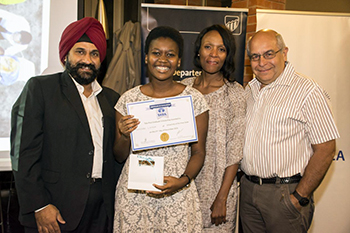
From left: Mr Harneet Luther, Nomcebo Langa
(first-place winner), Palesa Makhetha and Dr Johan van Zyl.
Tata Africa celebrated the class of 2016 of the Department of Business Management at the University of the Free State (UFS) on 1 December 2016 on the Bloemfontein Campus. As part of the company’s Postgraduate Scholarship Programme, 11 academically and financially deserving students will have their postgraduate studies sponsored in 2017.
The scholarship programme was initiated by the Department of Business Management in 2012, in collaboration with Tata Africa. The aim is to provide final-year Strategic Marketing students an opportunity to apply their theoretical knowledge by developing practical marketing strategies for any one of the Tata Group companies operating in Africa.
Students were invited to present their ideas to a panel of UFS and Tata Africa representatives, who selected the category winners. The categories were for the Tata Bakkies, Jaguar vehicles, Tata Chemicals in Magadi, Kenya, and Land Rover vehicles, intended to enhance the business’ competitive edge. The top three winners were Nomcebo Langa, Internal Marketing; Johan Nel, #OutPaceThis campaign; and Jesse Heath, Entrepreneurial Development campaign.
Topics covered by the students include target market identification, development of practical marketing strategies (digital and traditional), service strategies, experiential campaigns and application design. The Executive Director of Tata Africa Holdings, Mr Len Brand, said, “In the course of change in Africa and South Africa, in particular, we are very honoured to inspire young minds to bring innovative marketing solutions to the Tata business. We hope that their creativity will also inspire innovations in business, government, and civil society that will ultimately sell South Africa and Africa as good investment destinations.”
Dr Johan van Zyl from the Centre for Development Support congratulated the winners and encouraged them to continue on the path of augmenting creativity in business. In presenting the awards, Executive Director of Tata Automobile Corporation SA, Mr Harneet Luther, spoke of the origins of the Tata company, its vision and the level of innovation that its founders had, which was necessary in propelling it to where it is today. He commended the students for their outstanding performance and innovative campaigns. Since 2006, over 250 scholarships have been awarded through the University of the Free State, the University of KwaZulu-Natal and Wits University.